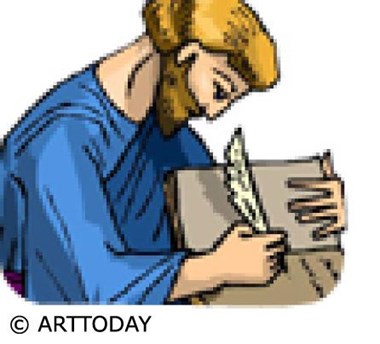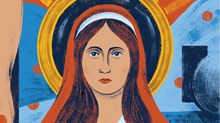
Mark Galli showed me, by his engaging, pastoral approach, how to make Christian history sing for a popular audience.
Mark, now the managing editor of Christianity Today, was managing editor of Christian History back in 1994, when I first discovered and fell in love with that magazine. The "Editor's Notes" with which Mark introduced each issue never failed to draw me into the trials and triumphs of Christianity's past, spiritually and emotionally as well as mentally.
Typical of his whole-hearted approach was his introduction to issue 42: Francis of Assisi:
"When I hear Jesus' words," Mark wrote, "especially hard words like the Beatitudes, I sometimes dismiss them: 'Impossible! Maybe Jesus can live them—after all, he was both God and man. But not mere mortals!' This baneful theology I readily reject with my mind but all too readily accept with my heart, and thus my moral resolve slackens. Then I read about Francis and discover something discomforting: Francis apparently lived the Beatitudes. … "
If that makes you want to read on, Mark has written a gem of a book on Francis's life and personality—I recommend it!
although in 2000 Mark left Christian History to lend his considerable talents to Christianity Today, "you can take the boy out of the magazine, but you can't take the magazine out of the boy." The following brief article, which Mark wrote as an editorial for the current issue of Christianity Today, is as contemporary as today's sales figures at your local Christian bookstore. But it could only have been written by someone still animated by a deep respect and affection for Francis and the thousands of others who still watch the modern church—and doubtless shake their heads— from the two-thousand-year-old "great cloud of witnesses."
On any given week, of the top-selling 15 non-fiction books on The New York Times list, three to five are histories or biographies. In contrast, a weekly glance at the Christian Booksellers Association (CBA) nonfiction bestsellers list usually turns up none.
Things are so bad that we are waving the white flag. Last spring, CBA multiplied its bestseller lists, so that separate rosters are now kept for Christian living, theology, Bible, inspirational, and other genres. But there is no list for the history/biography category. Apparently such books sell so rarely in Christian bookstores, there is no point in counting them.
As a movement, evangelicalism seems fascinated with ministering to generations X, Y, or Z, unearthing Christian insights from The Matrix, fixing marriages, revitalizing the church, inspiring the discouraged—and on it goes. But we struggle to find time to reflect on our heroes, to treasure the great moments of our past, to "remember the deeds of the Lord … of long ago" (Ps. 77:11).
One reason is that relatively few Christian books do the genre justice. Between hagiographies—inspirational histories—and academic treatises, lie relatively few accessible and responsible treatments.
The ones that do balance these twin responsibilities strain to get the attention they deserve. Publishers say they would publish and promote more histories if bookstores would give them more shelf space. Bookstore owners say there are not enough accessible history titles to create a lively section. Many evangelical academics are afraid to do something popular lest their colleagues think they are slumming; the popularizers are prompted by some publishers to whitewash their histories to make them more "edifying." A lot of Catch-22s here.
The good news is that there are accessible recent titles, written from a believer's point of view. Approachable scholarly histories can be found in Allen Guelzo's Abraham Lincoln: Redeemer President (Eerdmans) and Grant Wacker's history of early Pentecostalism, Heaven Below (Harvard). Recent evangelical biographies include John Perry's Charles Colson (Broadman & Holman), Bruce Shelley's Transformed by Love (on Vernon Grounds; Discovery House), and Kevin Belmonte's Hero for Humanity (on William Wilberforce; NavPress). Myrna Grant's Sacred Legacy (Baker) pulls together the writings of nine influential women in our history. And on it goes.
Breaking the Bind
How can we better showcase our heritage?
First, we encourage CBA to consider adding history/biography to its bestseller lists. Every quarter, 100,000 people read our sister publication Christian History. This market is too big to ignore.
Second, Christian bookstores might promote a few titles as an act of stewardship. Most Christian bookstore owners got into the business because they wanted to promote the fine books they themselves loved. Surely they don't have to give that up completely in order to pay the bills.
Third, Christian publishers should recall their own first love, as well, and continue to do their best (within understandable economic constraints) to keep their history lineup full and fresh.
The Roman historian Cicero said, "To be ignorant of what happened before you were born is to remain a child always." Like any movement, we are in constant need of maturity and wisdom. History is one genre that can help us.
Copyright © 2003 Christianity Today.Click for reprint information.

Support Our Work
Subscribe to CT for less than $4.25/month




























